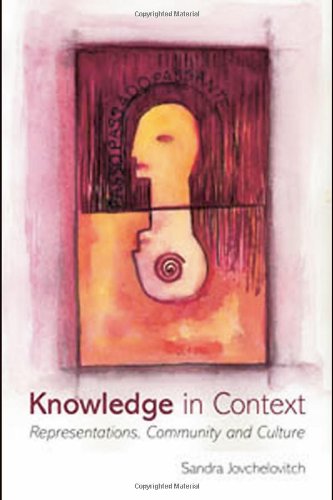

Most ebook files are in PDF format, so you can easily read them using various software such as Foxit Reader or directly on the Google Chrome browser.
Some ebook files are released by publishers in other formats such as .awz, .mobi, .epub, .fb2, etc. You may need to install specific software to read these formats on mobile/PC, such as Calibre.
Please read the tutorial at this link: https://ebookbell.com/faq
We offer FREE conversion to the popular formats you request; however, this may take some time. Therefore, right after payment, please email us, and we will try to provide the service as quickly as possible.
For some exceptional file formats or broken links (if any), please refrain from opening any disputes. Instead, email us first, and we will try to assist within a maximum of 6 hours.
EbookBell Team

4.7
76 reviewsThis book explores the relationship between knowledge and context through a novel analysis of processes of representation. Sandra Jovchelovitch argues that representation, a social psychological construct relating self, other and object-world, is at the basis of all knowledge. Understanding its genesis and actualisation in individual and social life explains what ties knowledge to persons, communities and cultures. It is through representation that we can appreciate the diversity of knowledge, and it is representation that opens the epistemic function of knowing to emotional and social rationalities.
Drawing on dialogues between psychology, sociology and anthropology, Jovchelovitch explores the dominant assumptions of western conceptions of knowledge and the quest for a unitary reason free from the ‘impurities’ of person, community and culture. She recasts questions related to historical comparisons between the knowledge of adults and children, ‘civilised’ and ‘primitive’ peoples, scientists and lay communities and examines the ambivalence of classical theorists such as Piaget, Vygotsky, Freud, Durkheim and Lévy-Bruhl in addressing these issues.
Against this background, Jovchelovitch situates and expands Moscovici’s theory of social representations, developing a framework to diagnose and understand knowledge systems, how they relate to different communities and what defines dialogical and non-dialogical encounters between knowledges in contemporary public spheres. Diversity in knowledge, she shows, is an asset of all human communities and dialogue between different forms of knowing constitutes the difficult but necessary task that can enlarge the frontiers of all knowledges.
Knowledge in context will make essential reading for all those wanting to follow debates on knowledge and representation at the cutting edge of social, cultural and developmental psychology, sociology, anthropology, development and cultural studies.